Best Supplements for Emotional Regulation in Mood Swings
Introduction
Emotional ups and downs are part of being human — but when mood swings start to feel unpredictable, intense, or exhausting, they can impact every part of life: relationships, focus, confidence, and even physical health. Whether these shifts come from stress, hormonal changes, poor sleep, or chronic inflammation, understanding what’s happening in your brain and body is the first step toward balance.
In this article, we’ll explore the best supplements for emotional regulation, how they work, and how to combine them with lifestyle practices like breathwork, nutrition, and therapy for long-lasting emotional stability.
🌧️ Understanding Mood Swings: What’s Going On Inside
Mood swings occur when the brain’s neurochemical balance fluctuates. These changes can affect serotonin, dopamine, GABA, and cortisol — the chemicals that regulate happiness, motivation, calm, and stress response.
When these systems are off balance, you might feel:
Happy and energized one moment, sad or irritated the next
Sensitive to small stressors
Drained after emotional highs
Overwhelmed by tasks that normally feel manageable
Common causes include:
Stress and burnout 🧠 (chronic cortisol elevation)
Hormonal fluctuations 💫 (PMS, perimenopause, thyroid issues)
Nutrient deficiencies 🍽️ (especially magnesium, B vitamins, and omega-3s)
Gut imbalances 🦠 (since serotonin is largely produced in the gut)
Sleep deprivation 🌙
Emotional trauma or dysregulation patterns from childhood
Fortunately, nature provides powerful tools to support the body’s mood-regulating systems — gently, effectively, and safely.
🌿 How Supplements Help Stabilize Emotions

Supplements support neurotransmitter balance, reduce inflammation, and optimize hormone and nervous system function. Unlike pharmaceuticals, they often work by supporting the root cause — replenishing what’s missing or calming what’s overactive.
There are three major categories of mood-stabilizing nutrients:
Nutritional cofactors – vitamins and minerals your brain uses to make neurotransmitters.
Adaptogens – herbs that help your body adapt to stress and restore homeostasis.
Amino acids & targeted compounds – building blocks that directly influence serotonin, dopamine, or GABA.
Let’s look at the best ones in each category 👇
💊 The Best Supplements for Emotional Regulation
🌞 Magnesium: The Calm Mineral
Magnesium is one of the most important minerals for mood regulation. It helps calm overactive neurons, balances cortisol, and supports GABA — the neurotransmitter responsible for relaxation.
When you’re low in magnesium, you’re more likely to feel anxious, irritable, or unable to “shut off” your thoughts.
Forms:
Magnesium glycinate (best for calming and sleep)
Magnesium threonate (crosses the blood-brain barrier for cognitive support)
Dosage: 200–400 mg per day, usually taken in the evening.
🧘 Bonus: Magnesium also helps reduce PMS-related mood swings and supports more restful sleep.
🧠 B-Complex Vitamins: Fuel for Emotional Stability
B vitamins — especially B6, B9 (folate), and B12 — are essential for creating serotonin and dopamine. Low levels can make you feel moody, foggy, or easily overwhelmed.
Benefits:
Improves stress resilience
Reduces fatigue and irritability
Supports serotonin and dopamine production
Dosage: Take a balanced B-complex in the morning with food.
💡 Tip: Choose methylated forms (like methylcobalamin and methylfolate) for better absorption, especially if you have the MTHFR gene mutation.
🐟 Omega-3 Fatty Acids: Anti-Inflammatory Mood Support
EPA and DHA, the active components in fish oil, are powerful regulators of neuroinflammation — one of the silent causes of mood instability.
Low omega-3 levels have been linked to depression, irritability, and even bipolar mood fluctuations.
Benefits:
Improves serotonin signaling
Stabilizes emotions
Reduces brain inflammation
Dosage: 1000–2000 mg of combined EPA/DHA daily (look for 60%+ EPA for mood support).
🥗 Vegan option: Algae oil supplements offer DHA without fish sources.
🌸 L-Theanine: Calm Without Drowsiness
L-Theanine, an amino acid from green tea, increases alpha brain waves — the same frequency seen in relaxed but alert states.
Benefits:
Promotes calm focus
Reduces overthinking and emotional reactivity
Smooths out caffeine jitters
Dosage: 100–200 mg, often paired with caffeine or morning tea.
☕ Perfect for: Those who experience anxiety or irritability after coffee.
🌿 Ashwagandha: Stress Hormone Balancer
Ashwagandha is a powerful adaptogen that helps reduce cortisol and supports balanced energy and mood.
It works by calming the body’s stress response system (HPA axis), making it easier to stay grounded in emotionally charged moments.
Benefits:
Lowers stress and anxiety
Improves resilience and focus
Stabilizes hormonal mood swings
Dosage: 300–600 mg of standardized extract (KSM-66 or Sensoril).
🌙 Bonus: Also improves sleep quality, making next-day mood steadier.
🌺 Rhodiola Rosea: Uplifting Emotional Adaptogen
When fatigue or emotional flatness accompany mood swings, Rhodiola can help. It supports dopamine pathways and prevents burnout.
Benefits:
Reduces emotional fatigue
Improves motivation and joy
Enhances resilience to daily stress
Dosage: 200–400 mg of standardized extract, taken in the morning.
⚡ Caution: It can be slightly stimulating, so avoid late-day use.
🧬 GABA (Gamma-Aminobutyric Acid): The Peace Neurotransmitter
GABA is your brain’s natural “brake pedal.” It reduces overexcitation, calming anxiety and emotional reactivity.
While GABA supplements don’t cross the blood-brain barrier easily, they still help via the gut-brain axis and vagus nerve activation.
Benefits:
Promotes calmness and better sleep
Reduces anxiety and tension
Supports emotional regulation during stress
Dosage: 100–500 mg before bed or during stressful times.
💤 Combine with magnesium or theanine for synergistic calm.
🧡 5-HTP: Serotonin Precursor
5-Hydroxytryptophan (5-HTP) is a direct precursor to serotonin — the neurotransmitter most associated with emotional stability.
Benefits:
Lifts mood
Reduces irritability
Helps regulate sleep and appetite
Dosage: 50–200 mg daily, preferably with vitamin B6 to support conversion.
⚠️ Caution: Do not combine with antidepressants (SSRIs) without medical guidance.
💧 Inositol: Gentle Mood Balancer
Inositol, often called “vitamin B8,” helps regulate serotonin and dopamine signaling, especially in anxiety-prone individuals or those with PMDD (premenstrual dysphoric disorder).
Benefits:
Calms anxious energy
Stabilizes premenstrual mood changes
Supports healthy insulin and cortisol balance
Dosage: 2–6 grams per day, divided into morning and evening doses.
🌼 Bonus: Also supports hormonal and metabolic balance in women.
🌿 Holy Basil (Tulsi): The Emotional Detox Herb
Tulsi has been used for centuries in Ayurvedic medicine to promote spiritual and emotional clarity. It gently reduces cortisol, supports adrenal recovery, and enhances inner peace.
Benefits:
Improves mood and focus
Reduces the impact of stress hormones
Encourages calm alertness
Dosage: 500–1000 mg of leaf extract daily.
🫖 Tip: Try it as a morning tea for a grounding start to the day.
⚡ CoQ10: Mitochondrial Mood Support
Low cellular energy can affect your brain’s ability to maintain emotional balance. Coenzyme Q10 helps your cells produce ATP — vital for focus and emotional endurance.
Benefits:
Reduces fatigue-related irritability
Enhances brain energy
Supports cardiovascular and mood health
Dosage: 100–200 mg with food (preferably fat-containing meals).
🌼 SAM-e: Methylation Support for Mood Regulation
SAM-e (S-Adenosylmethionine) plays a key role in neurotransmitter synthesis and methylation processes. Studies show it’s effective for low mood and irritability.
Benefits:
Supports serotonin and dopamine balance
Improves energy and motivation
Reduces sadness or irritability
Dosage: 400–1600 mg daily (start low and increase gradually).
⚠️ Note: Take on an empty stomach; avoid combining with SSRIs.
🌺 Probiotics: Gut-Brain Connection to Calm
Your gut microbiome directly influences serotonin production and emotional balance. Strains like Lactobacillus helveticus and Bifidobacterium longum are particularly beneficial for anxiety and mood regulation.
Benefits:
Enhances serotonin production
Reduces anxiety and irritability
Improves digestion and stress resilience
Dosage: 10–20 billion CFU daily.
🦠 Remember: A healthy gut = a balanced mind.
🌸 How to Combine Supplements for Emotional Stability
🧘 Gentle Mood-Support Stack (for daily balance):
Magnesium glycinate (200 mg at night)
Omega-3 (1000 mg EPA/DHA)
Vitamin B-Complex (morning)
L-Theanine (100 mg with coffee or tea)
🌿 Anti-Stress Stack (for reactive days):
Ashwagandha (500 mg)
Rhodiola (300 mg morning)
Holy Basil (tea or capsule)
🌙 Evening Calm Stack:
GABA (200 mg)
Magnesium glycinate (200 mg)
5-HTP (100 mg)
🧩 Rule of thumb: Always introduce one new supplement at a time to track how your body responds.
🌬️ Breathwork for Emotional Regulation

Breathwork is one of the fastest tools to calm mood swings. Your breathing directly communicates with your vagus nerve, the main nerve of the parasympathetic nervous system — your body’s relaxation circuit.
🌫️ Try this 3-minute routine:
Inhale deeply for 4 seconds
Hold for 2 seconds
Exhale slowly for 6 seconds
Repeat for 2–3 minutes
This activates a “vagal reset,” reducing cortisol and bringing emotional clarity.
🧘 You can also practice alternate nostril breathing (Nadi Shodhana) to balance the left and right hemispheres of the brain, enhancing emotional equilibrium.
💬 Therapy and Mindfulness for Emotional Awareness
Supplements can calm the nervous system — but emotional regulation often requires mental integration too. Therapy builds the emotional awareness that allows you to respond rather than react.
🧠 Helpful Therapeutic Modalities:
Cognitive Behavioral Therapy (CBT): Teaches how to reframe negative thought loops.
Dialectical Behavior Therapy (DBT): Excellent for emotional regulation and impulse control.
Somatic Therapy: Uses body sensations to release stored emotional tension.
Mindfulness-Based Stress Reduction (MBSR): Combines meditation and awareness training to reduce reactivity.
🪞 Key takeaway: Supplements help regulate the body; therapy helps rewire the mind. Together, they create a stable foundation for peace.
☀️ Lifestyle Habits That Reinforce Supplement Benefits
🌙 Prioritize 7–9 hours of sleep: The brain resets emotional circuits during REM.
🥗 Eat balanced meals: Include omega-3s, complex carbs, and protein to steady blood sugar.
🚶 Move daily: Exercise releases endorphins and increases dopamine sensitivity.
🧘 Practice mindfulness: Just 10 minutes daily can retrain emotional patterns.
🌞 Get sunlight: Morning light boosts serotonin, which converts to melatonin at night.
💧 Stay hydrated: Even mild dehydration worsens irritability.
💡 Emotional balance isn’t about perfection — it’s about creating steady patterns that support calm and clarity.
🌈 8. Putting It All Together
If your emotions often feel like a rollercoaster, you don’t need to “fix” yourself — you just need to support the systems that manage emotional regulation.
Nutrients like magnesium, B vitamins, and omega-3s provide the biochemical foundation.
Adaptogens like Ashwagandha and Rhodiola balance your stress hormones.
Breathwork and therapy strengthen your inner regulation tools.
When these elements work in harmony, you develop not just mood stability — but emotional resilience.
💬 Remember: consistency matters more than intensity. Start small, stay steady, and your emotional rhythm will begin to even out over time.
📚 References
Benton, D. (2002). “Micronutrient supplementation and mood.” Nutritional Neuroscience, 5(6), 453–469.
Hibbeln, J. R. (2001). “Fish consumption and major depression.” The Lancet, 357(9272), 407–408.
Darbinyan, V., et al. (2000). “Rhodiola rosea in the treatment of stress and fatigue.” Phytomedicine, 7(5), 365–371.
Kimura, K., et al. (2007). “L-Theanine reduces physiological and psychological stress.” Biological Psychology, 74(1), 39–45.
Porges, S. W. (2011). The Polyvagal Theory: Neurophysiological Foundations of Emotions and Self-Regulation. W. W. Norton.
Jorde, R., et al. (2008). “Effects of vitamin D supplementation on mood.” J Clin Endocrinol Metab, 93(2), 389–395.
Freeman, M. P., et al. (2006). “Omega-3 fatty acids for mood disorders.” Am J Psychiatry, 163(6), 969–978.
Streeter, C. C., et al. (2012). “Effects of yoga and controlled breathing on anxiety and mood.” J Altern Complement Med, 18(5), 480–485.
Related Posts
-

Nootropics That Promote Calm and Rest
Explore the world of calming nootropics — natural brain enhancers that promote relaxation, better focus, and deeper rest. Learn how L-Theanine, magnesium, ashwagandha, and other adaptogens help balance your nervous system, reduce stress, and support restorative sleep.
-

Best Natural Supplement Stack for Sleep
Discover the best natural supplement stack for deep, restorative sleep. Learn how nutrients like magnesium, L-theanine, glycine, and calming herbs such as chamomile and ashwagandha work together to relax your body, calm your mind, and improve sleep quality—naturally and safely.
-

Combining L-Theanine and Magnesium for Sleep: A Calm Night, Naturally
Discover how combining L-Theanine and Magnesium can help you drift into deep, restorative sleep. Learn how this natural duo calms the mind, relaxes the body, and supports your nervous system—without grogginess the next morning.
-

How to Sleep Better After Intense Workouts
Struggling to fall asleep after a tough workout? Learn how to optimize your post-training recovery with nutrition, hydration, and science-backed sleep strategies. Discover how to calm your nervous system, balance hormones, and wake up fully recharged for your next session.
-

Ashwagandha and Valerian: A Bedtime Combo for Deep Rest and Emotional Reset
Discover the calming synergy of Ashwagandha and Valerian root, two natural sleep aids that help quiet the mind, ease anxiety, and promote deeper rest. Learn how this herbal duo supports the nervous system, balances stress hormones, and restores emotional peace — without next-day grogginess.
-

How to Create a Resilience-Boosting Diet
Discover how to build emotional and physical strength from the inside out with a resilience-boosting diet 🍎. Learn which foods stabilize your mood, how supplements like magnesium and omega-3s strengthen your stress response, and why pairing nutrition with breathwork and therapy creates lasting calm, focus, and vitality 🌿💪.
-

Best Teas and Herbal Blends for Calmness: Nature’s Way to Restore Inner Peace
Ashwagandha, the ancient adaptogenic herb, helps your body find balance during stress. Known as “Indian ginseng,” it supports cortisol regulation, boosts energy, and restores calm clarity. Discover how this powerful root promotes resilience, emotional balance, and steady vitality — one cup at a time. 🌸
-

Parenting and Emotional Strength: How to Raise Children Without Losing Yourself
Empathy is the bridge that connects hearts — the quiet power to understand, feel, and support another’s emotions without judgment. Learn how empathy strengthens relationships, enhances communication, and cultivates deeper compassion in everyday life. 🌿
-

How to Bounce Back from Public Failure: Reclaiming Confidence, Purpose, and Power
Visualization is more than imagination — it’s brain training for resilience. By picturing calm, success, or healing, you activate the same neural pathways as real experience. Learn how daily visualization rewires your brain for confidence, emotional balance, and recovery from stress. ✨
-

Coping with Financial Stress Through Resilience: How to Stay Grounded When Money Feels Tight
Body awareness is the foundation of emotional resilience. By tuning into your body’s signals — tension, fatigue, or calm — you learn to recognize stress before it overwhelms you. Discover how mindfulness, gentle movement, and breathwork can deepen your connection with your body and restore balance from the inside out. 🧘
-

How to Stay Positive During Chronic Illness: A Guide to Emotional Strength and Hope
Creativity is more than art — it’s a form of healing. Whether through painting, writing, music, or small acts of expression, creativity helps release emotion, calm the nervous system, and reconnect you to joy. Discover how to use creativity as a tool for emotional balance, resilience, and self-discovery. 🌿
-

Resilience Tips for Caregivers: How to Stay Strong While Caring for Others
Joy isn’t the absence of pain — it’s the quiet strength to find light even in challenging times. Cultivating joy through small daily moments restores balance, releases stress, and reminds you of life’s beauty. Learn how to reconnect with authentic happiness, rebuild emotional energy, and nurture your nervous system through gratitude, presence, and play. 🌿
-

Building Resilience After a Breakup: How to Heal, Rebuild, and Rise Stronger
Social connection is one of the strongest predictors of emotional resilience. During difficult times, genuine relationships act as anchors — calming the nervous system, reducing stress hormones, and helping you regain perspective. Learn how cultivating real human connection can strengthen your mind, heart, and overall well-being. 🌿
-

How to Stay Emotionally Strong During Job Loss
Your emotions are powered by brain chemistry — a delicate balance of neurotransmitters like serotonin, dopamine, and cortisol. When these chemicals work in harmony, you feel calm, focused, and resilient. Learn how daily habits, nutrition, and mindfulness can support your brain chemistry and boost emotional well-being naturally. 🌿
-

The Role of Hormones in Emotional Stability: How Your Chemistry Shapes Your Calm
Hormones shape more than your body — they shape your emotions, resilience, and sense of calm. From cortisol to serotonin, these chemical messengers influence how you react to stress, connect with others, and recover from challenges. Learn how to balance your hormones naturally to build lasting emotional stability and harmony within. 💫
-

Mitochondria and Emotional Energy: The Cellular Power Behind Your Mood
Breathwork is one of the most powerful tools for emotional regulation and cellular balance. Through intentional breathing, you can calm your nervous system, increase oxygen flow to the brain, and even support mitochondrial energy. Learn how conscious breathing connects body and mind — transforming stress into presence and emotional strength. 🌿
-

Inflammation and Its Impact on Mood Resilience: The Silent Link Between Body and Mind
Inflammation doesn’t just affect the body — it impacts the mind. Chronic inflammation alters brain chemistry, depletes serotonin, and makes emotional recovery harder. Learn how calming inflammation through nutrition, mindfulness, and sleep can restore balance, resilience, and a renewed sense of emotional strength. 💫
-

How Antioxidants Protect Emotional Well-being: The Hidden Link Between Oxidative Stress and Mental Health
Antioxidants do more than protect your body — they defend your mind. By neutralizing oxidative stress, antioxidants support serotonin, dopamine, and brain energy pathways that keep you calm, focused, and emotionally balanced. Discover how foods like berries, green tea, and dark chocolate nourish your brain, boost mood, and strengthen resilience from the inside out. 🌿✨
-

The HPA Axis and Emotional Health: The Hidden Bridge Between Stress and Mind
Neuroplasticity — the brain’s ability to rewire and adapt — is the foundation of emotional healing and resilience. When you face stress, trauma, or change, your neural pathways can reshape themselves to support new patterns of calm, focus, and self-awareness. Learn how daily practices like mindfulness, therapy, and breathwork strengthen neuroplasticity to transform emotional pain into personal growth. 🌸
-

Why Cortisol Control Is Key to Resilience: Mastering Stress to Build Emotional Strength
Controlling cortisol — the body’s main stress hormone — is the secret to lasting resilience. When cortisol levels stay balanced, your mind becomes clearer, emotions steadier, and energy more sustainable. Learn how breathwork, mindset shifts, adaptogens, and daily rhythms can help you calm your stress response and build true inner strength. 🌞💪
-

Dopamine’s Influence on Motivation and Recovery: Reigniting Drive and Balance
Healthy relationships are the foundation of emotional balance and resilience. Whether romantic, familial, or platonic, genuine connection releases dopamine, serotonin, and oxytocin — the brain’s “bonding trio” — helping us feel secure, motivated, and seen. Learn how trust, empathy, and communication not only strengthen your connections but also reshape your nervous system for deeper emotional well-being. 🌿🤝
-

The Role of Serotonin in Resilience: How This “Mood Molecule” Shapes Emotional Strength
Serotonin — often called the “resilience molecule” — plays a vital role in how we handle stress, regulate mood, and recover from emotional challenges. Beyond happiness, this powerful neurotransmitter helps balance the gut-brain axis, stabilize the nervous system, and support emotional flexibility. Learn how nutrition, sunlight, mindfulness, and adaptogens can naturally boost serotonin and strengthen your emotional resilience. 🌞🧠
-

How Neuroplasticity Supports Emotional Growth: Rewiring the Brain for Resilience
Neuroplasticity is the brain’s built-in power to grow, adapt, and heal — and it’s the foundation of emotional transformation. Every mindful breath, compassionate act, or reframed thought strengthens new neural pathways that support resilience and self-awareness. Learn how your brain rewires through daily habits, helping you turn emotional challenges into opportunities for growth and calm. 🌿
-

Tai Chi and Adaptogens for Mind-Body Balance: The Art of Harmonizing Energy and Resilience
Alchemy isn’t just an ancient science — it’s a timeless symbol of transformation and inner balance. By blending the physical and spiritual, alchemy teaches us that change begins from within. Just as metals are refined into gold, we too can transmute emotional pain, stress, and chaos into clarity and strength through mindful practice and self-awareness. 🌙✨
-

Cold Therapy and Emotional Control: Training the Mind Through the Body
Cold therapy isn’t just for athletes — it’s a tool for emotional mastery. By exposing your body to controlled cold, you train your nervous system to stay calm under stress, improving focus, mood, and resilience. This article explores the science of cold exposure, its impact on hormones and the vagus nerve, and how ice baths and cold showers can help you build emotional control, one breath at a time. 🧊🧘♂️
-

How Music Influences Emotional Recovery: The Healing Soundtrack of the Mind
Neuroplasticity — the brain’s ability to rewire and heal itself — is at the heart of emotional recovery. Through mindful habits, music, therapy, and consistent mental stimulation, your brain can form new connections that support resilience and well-being. Discover how neuroplasticity turns pain into growth, helping you rebuild balance, focus, and emotional strength. 🌿
-

Nature Therapy for Building Resilience: Reconnecting With the Healing Power of the Earth
Nature therapy helps rebuild emotional resilience by reconnecting you with the healing rhythms of the Earth. From forest walks to sunlight exposure, nature restores balance to your nervous system, lowers stress hormones, and teaches emotional adaptability. Learn how spending time outdoors can enhance mental clarity, calm anxiety, and awaken your natural capacity to heal. 🌞
-

Breathwork Techniques That Pair with Supplements: The Ultimate Synergy for Stress Relief and Mental Clarity
Breathwork and supplements create a powerful mind-body synergy for stress relief, focus, and energy. By combining intentional breathing with adaptogens, nootropics, and calming nutrients, you can naturally regulate cortisol, sharpen mental clarity, and boost emotional balance. This guide explores the best breathwork techniques and supplement pairings to help you feel centered, calm, and energized from the inside out. 🌿
-

Why Cortisol Balance Matters for Emotional Strength
Balancing cortisol — your body’s main stress hormone — is essential for emotional resilience. When cortisol is chronically high, your mind stays stuck in survival mode, leading to fatigue, anxiety, and emotional instability. This article explores how nutrition, supplements, breathwork, and therapy can help restore healthy cortisol rhythms, regulate the nervous system, and strengthen your ability to handle life’s challenges with calm focus and emotional strength. 🌿
-

Best Supplements for Students During Exam Season: Focus, Energy, and Memory Support
Studying late into the night? Learn which natural supplements can boost focus, memory, and mental stamina during exam season — without the crash. From omega-3s to Bacopa and Rhodiola, discover your brain’s ultimate exam support stack. 🎓🧠
-

Natural Memory Boosters for Seniors: How to Keep Your Mind Sharp and Focused
Stay mentally sharp and confident as you age. Discover science-backed natural supplements and lifestyle habits that boost memory, focus, and brain longevity for seniors. 🌿🧠
-

The Link Between Stress, Cortisol, and Memory Loss
Chronic stress can quietly erode your memory — and cortisol is the key culprit. Learn how stress hormones affect the brain, why the hippocampus shrinks under pressure, and how natural strategies can help you restore memory and mental clarity. 🧠✨
-

How to Build a Daily Supplement Routine for Memory Health
Want to sharpen your memory and stay mentally clear? Learn how to build a daily supplement routine for memory health — from morning focus to nighttime brain repair. Discover science-backed nutrients that boost recall, focus, and long-term cognitive resilience. 🧠🌿
-

Top 5 Natural Supplements for Memory Recall and Focus
Looking to boost memory and concentration naturally? Discover the top 5 supplements — Bacopa, Ginkgo Biloba, Lion’s Mane, Rhodiola, and Phosphatidylserine — that enhance focus, recall, and long-term brain health. 🧠✨
-

Top Supplements to Balance Mood Naturally
From omega-3s to adaptogens, discover the top natural supplements proven to support emotional balance, reduce stress, and promote inner calm — safely and effectively. 🌿✨
-
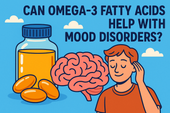
Can Omega-3 Fatty Acids Help with Mood Disorders?
Omega-3 fatty acids do more than support heart health — they can help balance mood, reduce depression, and calm anxiety. Discover how EPA and DHA nourish your brain, fight inflammation, and support emotional well-being from within. 🌊🧠
-

Vitamin D and Mood: The Sunshine Vitamin for Emotional Balance
Could the key to emotional balance be as simple as a little sunlight? Discover how vitamin D — the sunshine vitamin — influences serotonin, reduces inflammation, and helps you feel more positive and resilient year-round. ☀️💛
-

The Role of Magnesium in Reducing Irritability and Low Mood
Feeling on edge or emotionally drained? Magnesium could be the missing link between your body and your mood. Discover how this essential mineral reduces irritability, balances neurotransmitters, and helps your nervous system find calm again. 🌿✨
-
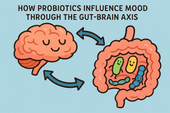
How Probiotics Influence Mood Through the Gut-Brain Axis
Discover how probiotics can do more than support your digestion—they can actually uplift your mood. This article explores the fascinating gut-brain axis and how balancing your gut bacteria through probiotics may help reduce anxiety, improve emotional stability, and support long-term mental well-being. 🌿🧠
-
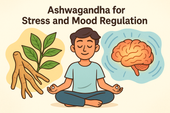
Ashwagandha for Stress and Mood Regulation
Discover how Ashwagandha, the powerful adaptogenic herb 🌿, helps your body manage stress and regulate mood. Learn how it balances cortisol, boosts GABA and serotonin, and supports emotional stability — helping you feel calm, focused, and resilient every day.
-
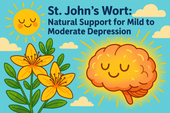
St. John’s Wort: Natural Support for Mild to Moderate Depression
Discover how St. John’s Wort, the “sunshine herb” 🌼, naturally supports mild to moderate depression. Learn how it boosts serotonin, balances mood, and promotes emotional resilience — with research showing its effectiveness compares to antidepressants, but with fewer side effects.
-
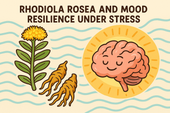
Rhodiola Rosea and Mood Resilience Under Stress
Discover how Rhodiola rosea helps your body adapt to stress 🌿. Learn how this powerful adaptogen balances cortisol, supports serotonin and dopamine, and strengthens emotional resilience — helping you stay calm, focused, and energized under pressure.
-

Chamomile and Lavender: Herbal Calm for Emotional Fluctuations
Discover how chamomile and lavender bring calm to emotional ups and downs 🌿. Learn how these two soothing herbs balance your nervous system, ease anxiety, and support restful sleep — naturally helping you find peace and emotional stability.
-
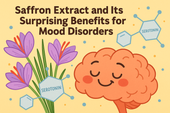
Saffron Extract and Its Surprising Benefits for Mood Disorders
Discover how saffron extract — the golden spice of joy 🌸 — can naturally support mood balance, ease anxiety, and lift mild depression. Learn what science says about its serotonin-boosting power, the ideal dosage, and how this ancient remedy compares to modern antidepressants.
-
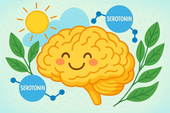
5-HTP and Serotonin: A Natural Path to Lifting Mood
Discover how 5-HTP naturally boosts serotonin 🌞 — the neurotransmitter behind mood, sleep, and emotional balance. Learn how this plant-derived compound supports happiness, reduces anxiety, and improves rest by helping your brain create more serotonin the gentle, natural way.
-
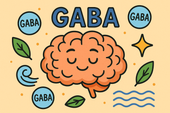
GABA Supplements for Reducing Anxiety and Mood Swings
Discover how GABA supplements can help reduce anxiety and balance mood naturally 🌿. Learn how this calming neurotransmitter works to quiet the mind, ease stress, and improve sleep — plus which nutrients and habits can boost your body’s own GABA production for long-term emotional stability.
-
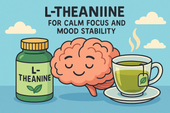
L-Theanine for Calm Focus and Mood Stability
Discover how L-theanine, the calming compound found in green tea 🍵, promotes focus, relaxation, and mood stability. Learn the science behind how it balances neurotransmitters, reduces stress hormones, and enhances clarity — helping you stay centered, calm, and productive without sedation.
-
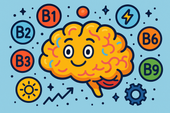
B Vitamins and Brain Chemistry: Supporting Energy and Emotional Balance
Discover how B vitamins power your brain chemistry ⚡. Learn how B6, B9, and B12 support serotonin, dopamine, and energy production — helping boost focus, mood, and emotional balance. From diet to supplements, explore how this vital nutrient group keeps your mind resilient and your energy steady.
-

N-Acetyl Cysteine (NAC) and Mood Disorders: What the Research Says
Learn how N-Acetyl Cysteine (NAC) supports brain health and mood balance 🧠. Discover how this antioxidant helps reduce oxidative stress, regulate glutamate, and improve emotional stability in depression, bipolar disorder, and anxiety — backed by cutting-edge psychiatric research.
-

Supplements for Bipolar Disorder: What May Support Stability
Discover the best supplements for bipolar disorder 🌿 that may support emotional stability and brain health. Learn how nutrients like omega-3s, magnesium, vitamin D, and NAC can help reduce inflammation, balance neurotransmitters, and complement traditional treatment safely.


















































